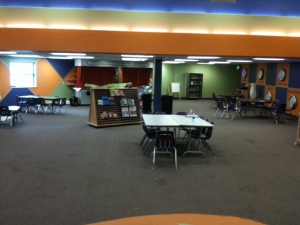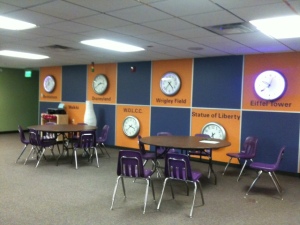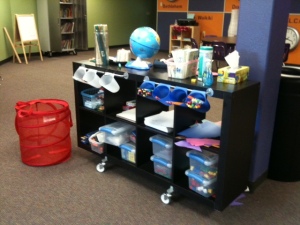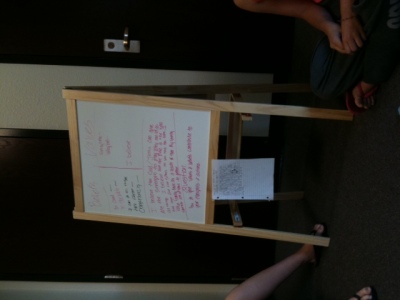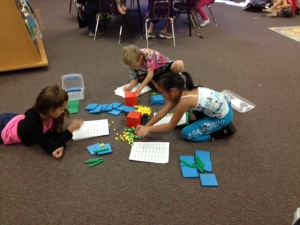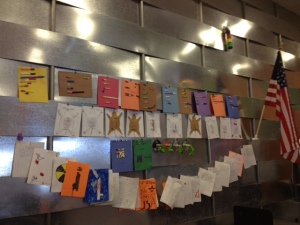This is worth reading for a lighthearted laugh!
15 Cringeworthy Things Little Kids Say in Public
Posted by Jill Smokler on November 14, 2011 at 8:46 AM
Last week, Evan underwent a speech evaluation. He was quiet as a mouse the entire time, simply giving one-word, bare minimum answers. The therapists took notes as he was clearly flunking the test with a big fat F.
Suddenly, he turned to me and loudly announced, "Mommy, my butt itches so bad and I really, really want to scratch it!!" The good news: His articulation was perfect. The bad? The therapists actually wrote the phrase on his test for the entire team to analyze.
Later that day, I asked my Facebook friends for the most embarrassing things their kids had ever said. Bless their souls, they may have me beat ...
1. While discussing the 10 Commandments at Vacation Bible School (!), comparing "God's Rules" with rules the kids might have at home, my oldest -- then about 7 -- spouted: AT MY HOUSE, YOU DON'T DRINK FROM MOM'S CUP OF SODA WHEN IT HAS LIQUOR IN IT! -- Meredith
2. [My son] asked where my wienie was as I got out of the shower one day. I said, "Well, Mommies have a different kind of wienie than Daddies." So we get to the store later that day and he informs the cashier, "My Mommy has a different kind of wienie." Awesome. --Tiffini
3. Grocery store experience: my kid screamed, "PIRATE!!!" at a man wearing an eye patch. -- Cora
4. My son is bi-racial and thought every black man was Daddy. Once we were at the local grocery store and our cashier happened to be a black teenage boy. As we approached the register, my then 2-year old started yelling over and over, "DADDY." -- Lauren
5. My 4-year-old son felt the need to warn "old" people they will die ... he told a lady in the grocery, "Old people die ... and you don’t look so good" -- Edna
6. My 6-year-old grabbed our Rabbi's butt and said, "Squishy, squishy." -- Vicki
7. Age 3, regarding a morbidly obese lady dressed in red in a store: "Holy crap, that is a BIG, RED shirt!" -- Kerri
8. Saying our dinner prayer with the family, my 5-year-old wanted to say the prayer. So being that he wanted to be the big boy, we said sure. He says: God is Great, Beer is Good, and People are Crazy! -- Lena
9. Walking by the wine section of Whole Foods: "Mommy! Look at all this mommy juice! Look! Mommy juice everywhere!" I got more than a few snickers. -- Emily
10. My husband took my 4-year-old son to his uncle's funeral. When they were bringing the casket in or out of somewhere, my son said (pretty loudly), "What's in the box?" Luckily it got a few laughs, but ohhhh that was not one of his finest moments! -- Christina
11. My son pointed at a guy playing basketball, who had a prosthetic leg, and shouted, "Look mom! He's a cyborg!" I dragged him away quickly. He's totally into robots and all that, so it was a huge compliment coming from my son! -- Carissa
12. When I quit smoking, my 5-year-old at the time (she's 23 now) told her kindergarten teacher that she was so proud of me because I quit drugs. -- Erin
13. I guess I did not have great bathroom boundaries with my daughter. While in a shopping cart, checking out, sucking on a lollipop, my daughter pulls the lollipop out of her mouth and tells the person bagging the groceries: "Sometimes my mommy pees red." She said it like I was a superhero. -- Jennifer
14. Just a few weeks ago, my son was in the bath and declared, "I just have a kid-sized penis because I'm a kid. Not Daddy, though. He's a grownup, so he has a big penis. Daddy, your penis is THIS big" [said while holding his hands quite a wide distance apart]. My husband, however, told him, "Now THAT you're allowed to repeat anywhere and everywhere you want." -- Dorothy
15. My 3-year-old daughter was out with her grandma, and the lady in front of them in line was writing a check without ID and generally being irritating. At the top of her lungs, she sighs and says, "Grandma, this is taking FOREVER. It takes daddy less time to poop and he's in there long enough to play a world of Angry Birds!" -- Jane
What's the most embarrassing thing your kid ever said?
As a public educator, I aim to share my story with those interested about what really happens inside today's classroom. I hope my stories inspire, educate, and entertain you, as the calling of teaching is never neat or predictable. Please note that my blog content does not necessarily reflect the viewpoints or beliefs of my school district or colleagues.
Super Teacher's Job is Never Done!

Photo courtesy of DiscoveryEducation.com
Teaching is the profession that teaches all the other professions. ~ Author Unknown
My goal is to reveal one teacher's humble journey of self-reflection, critical analysis, and endless questioning about my craft of teaching and learning alongside my middle school students.
"The dream begins with a teacher who believes in you, who tugs and pushes and leads you to the next plateau, sometimes poking you with a sharp stick called 'truth'." ~ Dan Rather
Wednesday, November 30, 2011
Tuesday, November 29, 2011
Just for English Teachers....
I found this very funny for English teachers. Who thought this stuff up anyway? Read to bottom!!
Amazing we all learned English!
I think a retired English teacher was bored. THIS IS GREAT!
Read all the way to the end.
This took a lot of work to put together!
You think English is easy??
1) The bandage was wound around the wound.
2) The farm was used to produce produce .
3) The dump was so full that it had to refuse more refuse.
4) We must polish the Polish furniture.
5) He could lead if he would get the lead out.
6) The soldier decided to desert his dessert in the desert.
7) Since there is no time like the present , he thought it was time to present the present .
8) A bass was painted on the head of the bass drum.
9) When shot at, the dove, dove into the bushes.
10) I did not object to the object.
11) The insurance was invalid for the invalid.
12) There was a row among the oarsmen about how torow .
13) They were too close to the door to close it.
14) The buck does funny things when the does are present.
15) A seamstress and a sewer fell down into a sewer line.
16) To help with planting, the farmer taught his sow tosow.
17) The wind was too strong to wind the sail.
18) Upon seeing the tear in the painting I shed a tear.
19) I had to subject the subject to a series of tests.
20) How can I intimate this to my most intimate friend?
Let's face it, English is a crazy language. There is no egg in eggplant, nor ham in hamburger; neither apple nor pine in pineapple. English muffins weren't invented in England or French fries in France . Sweetmeats are candies while sweetbreads, which aren't sweet, are meat. We take English for granted. But if we explore its paradoxes, we find that quicksand can work slowly, boxing rings are square and a guinea pig is neither from Guinea nor is it a pig.
And why is it that writers write but fingers don't fing, grocers don't groce and hammers don't ham? If the plural of tooth is teeth, why isn't the plural of booth, beeth? One goose, 2 geese. So one moose, 2 meese? One index, 2 indices? Doesn't it seem crazy that you can make amends but not one amend? If you have a bunch of odds and ends and get rid of all but one of them, what do you call it?
If teachers taught, why didn't preachers praught? If a vegetarian eats vegetables, what does a humanitarian eat? Sometimes I think all the English speakers should be committed to an asylum for the verbally insane. In what language do people recite at a play and play at a recital? Ship by truck and send cargo by ship? Have noses that run and feet that smell?
How can a slim chance and a fat chance be the same, while a wise man and a wise guy are opposites? You have to marvel at the unique lunacy of a language in which your house can burn up as it burns down; you fill in a form by filling it out; an alarm goes off by going on.
English was invented by people, not computers, and it reflects the creativity of the human race, which, of course, is not a race at all. That is why, when the stars are out, they are visible, but when the lights are out, they are invisible.
PS. - Why doesn't 'Buick' rhyme with 'quick' ?
You lovers of the English language might enjoy this:
There is a two-letter word that perhaps has more meanings than any other two-letter word, and that is 'UP'
It's easy to understand UP meaning toward the sky or at the top of the list, but when we awaken in the morning, why do we wake UP ?
At a meeting, why does a topic come UP ?
Why do we speak UP and why are the officers UP for election and why is it UP to the secretary to write UP a report?
We call UP our friends.
And we use it to brighten UP a room, polish UP the silver; we warm UP the leftovers and clean UP the kitchen.
We lock UP the house, and some guys fix UP the old car.
At other times the little word has real special meaning.
People stir UP trouble, line UP for tickets, work UP an appetite, and think UP excuses.
To be dressed is one thing, but to be dressed UP is special .
A drain must be opened UP because it is UP .
We open UP a store in the morning but we close it UPat night.
We seem to be pretty mixed UP about UP !
To be knowledgeable about the proper uses of UP ,look the word UP in the dictionary.
In a desk-sized dictionary, it takes UP almost 1/4th of the page and can add UP to about thirty definitions.
If you are UP to it, you might try building UP a list of the many ways UP is used.
It will take UP a lot of your time, but if you don't giveUP , you may wind UP with a hundred or more.
When it threatens to rain, we say it is clouding UP .
When the sun comes out we say it is clearing UP .
When it rains, it wets the earth and often messes thingsUP .
When it doesn't rain for awhile, things dry UP .
One could go on and on, but I'll wrap itUP,
for now my time is UP ,
so........it is time to shut UP !
Now it's UP to you to decide what to do with this email.
Monday, November 28, 2011
iLearn Technology: An Interesting Peek
It's always fun to imagine and learn what learning and classroom spaces can really be...
Posted: 13 Nov 2011 05:56 PM PST
You may be wondering (or not) where the daily posts have been lately. Believe me, it isn’t for lack of tools to share! The slowness here is directly related to the time I am spending starting a school…as it turns out it is quite a bit of work!  If you are a reader of all of my blogs, you have already seen this one, but for those of you who only follow me here, I thought I would give you a peek into the school I started this year.
If you are a reader of all of my blogs, you have already seen this one, but for those of you who only follow me here, I thought I would give you a peek into the school I started this year.
Below, I share a picture of an incredible morning we had at Anastasis Academy where we welcomed singer/song writer Matthew West to join us for our morning devotion…we had NO idea it would result in the incredible private concert that it did. What an enormous blessing to have Matthew share his time, creativity and passion with us. Check out video of the morning on our school blog Stand Again.
|Kelly Tenkely|
It’s a pretty incredible thing to see dreams come to fruition.
For me it started with an obsession and passion for creating rich learning environments where every student was recognized as an individual. In that first post I wrote:
“I have a dreams of education. I have dreams of the way that schools should look. I have dreams of kids who find their passions. I have dreams of schools as rich learning centers.”
I had dreams of stripping the “vanilla” away so that passions could emerge.
Dreams of ditching that boxed curriculum that we call an education and watching the factory model fade into the rear-view mirror.
Dreams of ending the practice of viewing teachers (and students) as expendables.
I had dreams of schools that were beautiful, that were designed with students in mind.
Dreams that education would stop looking so much like the McRib.
Dreams of breaking free of the box, of valuing students and teachers, of using the right tools, of a school where a student’s inner da Vinci can break through, of a school that customizes learning.
I shared dreams of more fabulous failures.
The dreams started trickling into reality in March of this year (2011). In March I started getting some hints that these dreams weren’t really all that far-fetched. By May I had officially started a school. In August we opened the doors to Anastasis Academy with our first 50 students in 1st through 8th grade and had hired a dream team of 5 truly incredible teachers to lead them. In four short months we went from dreams to reality.
At Anastasis Academy, we lease space from a church building throughout the week. We have our own wing with classrooms, a playground, a gym and a kitchen. All of our furniture is on wheels. This makes it easy to adjust space daily based on needs, it is also a necessity since we use shared space. Twice a week we move all of our belongings across the hall into a storage room (if I’m honest, this is the part we could do without!). We can’t complain about the space. It is pretty incredible!
You will notice that we don’t have rows of desks. No teacher’s desk either. We have space that kids can move in. Corners to hide in, stages to act on, floors to spread out on, cars to read in. We are learning how to learn together, learning how to respect other children’s space and needs, learning how to discipline ourselves when we need to, learning how to work collaboratively, we are learning to be the best us.
You won’t see a worksheet at Anastasis. We use iPads. That isn’t to say that we ONLY use iPads, in fact, you’ll often see us building, cutting, pasting, writing on a whiteboard/chalkboard and even paper. We do a lot of blogging, a lot of reflecting, a lot of Evernotting, a lot of cinematography, a lot of discussing.
Every morning we start with a 15 minute walk outside together…as a community. We invite parents and siblings to be a part of our morning walk. Occasionally we have the dogs join in on the fun. After the walk we come inside as a whole-school for a time of devotions. Again, this is a time for us to build community, to foster the culture we want for our school. Families are invited to join us every morning. We always have at least one family and, many times, multiples. We pray with each other and for each other. We have hard conversations and funny conversations. We think together and challenge each other.
Our inquiry block is a time for hands-on transdisciplinary learning. This is my VERY favorite time to walk through classrooms. It is incredible to see the joy in discovery. It is incredible to have a second grade student with dyslexia discover an app to make stop motion animations, teach himself how to use it and proceed to stand up before 7th and 8th grade students to explain how stop motion works. I wish I could bring you all through the building during this time. Every time we have a visitor the students pause long enough to describe what they are doing, the learning that is happening. I often have to pick my jaw up off the floor. These kids are amazing.
We have no curriculum. At all. Zip. What did we do instead? We hired the very BEST teachers we could find. We gave them a base level of skills that we wanted students to have- an outline if you will. We used the Common Core Standards as our baseline. We don’t use the standards like most schools do. We use them to make sure that our students have the building blocks and foundations of learning in place. And then we let our students and teachers GO. The standards are not a weight we are tied to, they are the underpinnings that make it possible for us to soar and take our learning anywhere. When you look at the Common Core standards they are pretty underwhelming. I’m glad they are! They provide us with just enough momentum to propel us forward and then off we go on a journey of learning! We also have our big inquiry questions in place. From there, we go where the learning takes us, bunny trails and all. It is pretty fantastic. Today one of our primary students came out to see me and said, “Look at this boat I found in this new library book. Can I try to make it?” My answer: “Absolutely! What materials do we need?” Together we made a list of all the materials I needed to pull together for him. Tomorrow he will build that boat he is fascinated with and find out if it works the way he has planned. That is learning! Tell me what boxed curriculum allows time for that to happen? None. That is why we don’t have it.
In the afternoons we have more “content” area subjects (i.e. math and language arts). In the primary grades this means students building the skills they need to support their inquiry. In the intermediate grades this means honing those skills for better communication and more thorough inquiry. Again, we don’t work from a boxed curriculum. We find the lessons, approaches, and materials that work for the individual student. Sometimes this means working with manipulatives, sometimes it means exploring measurement outside, and sometimes it means using an app. It changes daily based on the needs of the students.
We have mixed age level classrooms. We do this for a lot of reasons. Most importantly, it is good for older and younger students to work together and learn from each other; it is vital that a child be able to work at their developmental level and progress as they are ready to; and it deepens inquiry when students with different perspectives work together.
Once every five weeks we invite the parents to join us for Parent University. This is a time for us to help parents understand this new way to do school. Detox, if you will. It is a time for us to show parents what best practices in education look like, why grades aren’t all they are cracked up to be, why play is important. It is a time for us to think and laugh together. It is a time to get questions answered.
Also every five weeks, we hold a “Meeting of the Minds”. This is a parent/teacher/student conference where we all get together and set our road map for the next 5 weeks. Students write goals with the help of their teacher. They have ownership over what they have done the last 5 weeks and tell mom and dad what they have planned for upcoming 5 weeks.
Every Friday we have a learning excursion or an opportunity for an “Anastasis Serves”. Learning excursions are field trips all over the place that help students start to recognize that learning doesn’t just happen when we are at school. Learning happens everywhere we are and, if we are paying attention, all the time. Anastasis Serves is a time for our students to give back to the global community. Sometimes this is a door-to-door scavenger hunt for donations, sometimes this is learning about orphans around the world, or packaging cookies and letters to send to our troops.
We don’t do grades, we do assessment all day every day while we learn. We don’t do homework, we pursue our families and passions at home. We don’t do worksheets, we do interesting (sometimes frustrating) work. We don’t do boxed curriculum, we do on-demand learning.
We do mistakes. We do community. We do collaboration. We do messy. We do play. We do fun. We do technology. We do learning.
How do we do all this? We have a 12 to 1 student teacher ratio (or less). We have incredible students, parents and teachers. We have stinking smart board members who are invested in our success and trust our judgement calls. We set our tuition at $8,000 (per pupil spending in our district) to show that even though we are private, this can be done in the public schools. We started with nothing…well almost nothing, we had dreams. There was no capital raised, no fund-raisers, no huge donation. We started the beginning of the year at $0 and put blood, sweat and tears into it.
This is not to say that we have it all figured out, that all of our students are perfect, that all of our staff or families are perfect. We are perfectly imperfect as every school is. We have days when the kids are BOUNCING off the walls, we have disagreements, tired teachers, stressed parents, a founder who has occasional melt downs (that would be me), students who need extra love and support, tight budgets, parents who demand different, scuffles, sniffles and band-aids…lots of band-aids. There is nowhere else I would rather be. No other group of people I would rather work with. No other students whose germs I would rather share. This is my dream.
There are moments throughout the day when I am stopped in my tracks by the realization-this is my dream.
Sunday, November 27, 2011
How ESOL Students Learn Best
Here is an interesting take on how our ESOL learners learn best:
What Teachers Can Learn from English-Language Learners
I am blogging from the Education Trust conference this afternoon in Arlington, Va., where one of the few presentations focused on English-language learners featured student voices.
Dr. Betty Smallwood from the Center on Applied Linguistics presented a fascinating video of students from Arlington County, Va., talking about what teachers can do better to teach them English. The video is part of a professional development program developed by the Center for Applied Linguistics.
Students were asked to explain what makes learning English easier, what makes it harder and what teachers can do to help them.
Four middle schoolers, all of them beginners in learning English, said that when teachers talk too fast, they struggle to learn. That seems like something that can be relatively easy for teachers of ELLs to fix, if they just are made aware that it's a problem. Students said distractions in the classroom—such as noisy classmates—are also a hindrance.
They all said that working with their peers in small groups is very helpful, a strategy that Dr. Smallwood said is supported by research. Aeydis from Mexico said teachers need to be more patient with her and not give up on her if she doesn't understand or get it the first time. Hababo, from Ethiopia, said teachers sometimes give her too much information and confuse her about what is most important.
Elementary students from Arlington County also had advice for teachers. From Beza, who is from Ethiopia: Give us more time to read what we want to read. And David from El Salvador said encouragement from his fellow ELL students was important for his success. They all talked about the importance of being able to talk to their teachers individually or in small groups. And teachers who take the time to define things for them during instruction are considered most helpful.
Rene Bostick, a principal in Arlington County whose school is full of ELLs, said what helps ELLs most in her experience are having teachers who were ELLs themselves and working with parents to help them learn English, read with their children (in any language) and use the Internet.
Currently, Dr. Smallwood takes this professional development program on the road, but hopes to have it available soon online for teachers and schools to access easily.
Thursday, November 24, 2011
How much CAN money buy??!!
An interesting take on Bill Gates's financial contributions to education...
Bill Gates' Big Play: How Much Can Money Buy in Education?
By Anthony Cody on November 5, 2011 11:39 AM
What would happen if one of the wealthiest men in the world decided to remake the institution of public education in America? What if that man believed he understood the secrets to success, and sought to align the nation's schools to his vision and methods? What if he decided to devote all his time and considerable money to this objective? Could he succeed? We are in the process of finding out just how far money and a sharply defined agenda can take you.
Bill Gates' first challenge was to define a vision. After experimenting with small schools, he discovered that this approach did not lead to consistently higher student performance. So he stepped back and said, OK, let's figure out just what IS going to increase those test scores? This was the crucial decision that has determined all other steps that have followed. The purpose of schooling has been determined by the measurement that tells us if we have succeeded. Although Bill Gates would perceive this as a neutral objective, in fact it has created a driving agenda for school change. The agenda is this: To recraft the system so that it is just as relentlessly focused on test score improvement as any business is focused on making money.
Bill Gates' first challenge was to define a vision. After experimenting with small schools, he discovered that this approach did not lead to consistently higher student performance. So he stepped back and said, OK, let's figure out just what IS going to increase those test scores? This was the crucial decision that has determined all other steps that have followed. The purpose of schooling has been determined by the measurement that tells us if we have succeeded. Although Bill Gates would perceive this as a neutral objective, in fact it has created a driving agenda for school change. The agenda is this: To recraft the system so that it is just as relentlessly focused on test score improvement as any business is focused on making money.
How does one go about making your own agenda everyone else's?
Bill Gates had a huge head start, in that No Child Left Behind had already set the wheels in motion. The idea that test scores are all that matter was already encoded into federal law and funding policies. The trouble is that law is punitive, cumbersome, illogical and bound to fail, by its own set of indicators. So we had to move beyond NCLB, and create a sustainable trajectory for test-driven reforms. This has been done in several ways.
First, acknowledge that current tests are of limited value. We cannot abandon them because they are all we have, and we cannot ignore the data they give us, even though it is not all we might wish for. Develop a plan for a new generation of tests that will be clearly superior to existing tests. These new tests will be richer, and incorporate technology, and based on new quasi-national standards that are likewise superior. The Gates Foundation has been a huge supporter of the Common Core Standards, and is partnering with the Pearson Foundation to develop online reading and math courses aligned with the standards.
First, acknowledge that current tests are of limited value. We cannot abandon them because they are all we have, and we cannot ignore the data they give us, even though it is not all we might wish for. Develop a plan for a new generation of tests that will be clearly superior to existing tests. These new tests will be richer, and incorporate technology, and based on new quasi-national standards that are likewise superior. The Gates Foundation has been a huge supporter of the Common Core Standards, and is partnering with the Pearson Foundation to develop online reading and math courses aligned with the standards.
It can't hurt to have your high-level staff transfer over to working for the US Department of Education. And if lobbying rules would block this due to ethical considerations, simply get waivers.
Bill Gates recently asserted:
It may surprise you--it was certainly surprising to us--but the field of education doesn't know very much at all about effective teaching.
It does surprise me, because I am familiar with the amazing work done over the past two decades by educators who created the National Board for Professional Teaching Standards. The National Board defined the highest level of teaching in line with all the things we value in a classroom. The standards include creating a strong classroom community that nurtures and supports all students. They include how well we meet the diverse needs of students from different cultures and linguistic backgrounds. The portfolios teachers assemble need to provide strong evidence that students are learning, including work samples that show how the teacher has challenged and guided the student. Now we see that the National Board faces tremendous pressure to include test score data as an important indicator of teacher quality.
Research can lead the way. The Gates Foundation is going after its goals by investing in research that implicitly defines "effectiveness" as the ability to increase test scores. The studies have been in the works for years, and are now being released one after another. The way the research questions are posed, and the data is interpreted, allows you to control a great deal of the debate. For example, a recent study of charter schools came out, funded by the Gates Foundation, in which the key question posed focused on the "impact...on student outcomes," as measured by test scores. Similarly, a huge project called Measures of Effective Teaching appears to define effectiveness primarily by looking at test score gains.
Since the accountability devices in NCLB were clumsy and punitive, invent a host of new mechanisms to reward success as well as punish failure. As much a possible, target these interventions down to the level of the individual teacher and student, to ensure compliance. Redefine professionalism for teachers so that it no longer means you have autonomy and responsibility for your work. Instead, being professional means you get paid for your results, and are subject to termination if you fail to help your students achieve what the predictive models project they ought to. Since teachers have been firmly opposed to this, do not make test scores the only means by which their performance is measured. Call this one of "multiple measures." But make sure other elements that are measured also align with growth in test scores.
Get non-profit advocacy groups on your side. If you hand out multi-million dollar grants to organizations that are piecing together their existence on much smaller sources, all of a sudden you can become their biggest sponsor. Pump money into advocacy groups like Teach Plus, and discover they are willing to lobby on behalf of things you value. Help sponsor the creation of new advocacy groups like Students First and they can help as well.
Get non-profit advocacy groups on your side. If you hand out multi-million dollar grants to organizations that are piecing together their existence on much smaller sources, all of a sudden you can become their biggest sponsor. Pump money into advocacy groups like Teach Plus, and discover they are willing to lobby on behalf of things you value. Help sponsor the creation of new advocacy groups like Students First and they can help as well.
Influence the media: Sponsor coverage of education in the media, including major television news events such as NBC's Education Nation. Last year's Education Nation was tied into the release of Waiting For Superman, which had a $2 million publicity effort sponsored by the Gates Foundation.
This sponsorship will earn you prominent placement and glowing comments from the news hosts, such as during this year's teacher town hall, when Brian Williams said:
The Gates Foundation, one of the sponsors of this event, and the largest single funder of education anywhere in the world. It's their facts that we're going to be referring to often to help along our conversation.
This shows how media sponsorship and research can fit together to define the very facts that are discussed in the public arena. These definitions are rarely challenged, as they are the implicit conditions one must accept in order to gain sponsorship. This influence is rarely even acknowledged or discussed critically, such is its power and pervasiveness.
Advocacy headed in a different direction has to fight uphill, and faces constant pressure to compromise or capitulate. If you want grant money for some teacher quality project, you will do much better if you agree to "multiple measures," including test scores. Individual teachers face intimidation, and fear speaking out publicly. The Save Our Schools March last summer was an exceptional event, in that it allowed teachers and parents to raise our voices together. The Occupation Movement now has given a public voice to those who question the corporate values permeating society, and this is likely to affect the debate in education as well. But the fate of our public schools is still very much in question.
Will the power and influence Bill Gates has developed succeed in transforming our schools according to his vision? Or will grassroots efforts and teacher wisdom sustain a different vision?
[Editorial note: Education Week Teacher is not affiliated with the Save Our Schools event; the views expressed in this opinion blog do not reflect the endorsement of Education Week or Editorial Projects in Education, which take no editorial positions.]
Subscribe to:
Posts (Atom)






